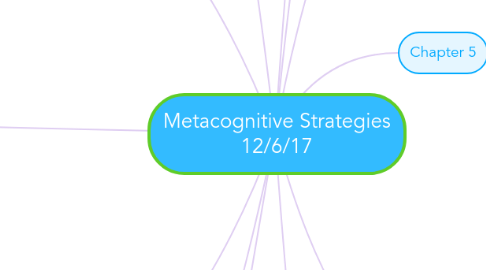
1. Chapter 1
1.1. Determination, resolve, goal
1.2. Goal setting
1.2.1. identify personal strengths
1.2.2. tough questions
1.2.3. establish goals for today, this week, and beyond
1.3. SMART goals
1.3.1. specific
1.3.2. measurable
1.3.3. attainable
1.3.4. relevant
1.3.5. time frame
2. Chapter 8
2.1. long term memory
2.1.1. procedural memory
2.1.2. semantic memory
2.1.3. episodic memory
2.2. improving your memory
2.2.1. review sheets
2.2.2. mind maps
2.2.3. flash cards
2.3. mnemonics
2.3.1. acronyms
2.3.2. acrostics
2.3.3. rhymes or songs
2.3.4. visualization
3. Chapter 9
3.1. Prepare for test taking
3.1.1. find out about the test
3.1.2. join a study group
3.1.3. get a tutor
3.2. prepare physically
3.2.1. maintain your regular sleep routine
3.2.2. follow your regular exercise program
3.2.3. eat right
3.3. symptoms of test anxiety
3.3.1. headaches
3.3.2. nausea
3.3.3. going blank
4. Chapter 10
4.1. information literacy
4.1.1. computer literacy
4.1.2. media literacy
4.1.3. cultural literacy
4.2. learning to be information literate
4.2.1. know how to find the information you need
4.2.2. learn how to interpret the information you need
4.2.3. have a purpose for collecting the information
4.3. evaluating sources
4.3.1. relevance
4.3.2. authority
4.3.3. bias
5. Chapter 11
5.1. Differences you will encounter in college
5.1.1. age
5.1.2. gender
5.1.3. sexuality
5.2. Seeking diversity in college
5.2.1. study abroad
5.2.2. student-run organizations
5.2.3. special-interest groups
5.3. Overcoming discrimination
5.3.1. raising awareness
5.3.2. fight hate on campus
5.3.3. challenge yourself to experience diversities
6. Chapter 12
6.1. Creating a budget
6.1.1. gather income information
6.1.2. gather expense information
6.1.3. gather information about living expenses
6.2. Cutting costs
6.2.1. needs vs. wants
6.2.2. low-cost transportation
6.2.3. pros/cons of living on campus
6.3. Financia; aid
6.3.1. grants
6.3.2. scholarships
6.3.3. work-study programs
7. Chapter 2
7.1. Managing your time
7.1.1. taking control of your time
7.1.2. memory is not your planner
7.1.3. use an actual planner
7.2. Time management tools
7.2.1. monthly calendars
7.2.2. academic calendars
7.2.3. daily planners
7.3. Dealing with distractions
7.3.1. text messages
7.3.2. lack of sleep
7.3.3. perfectionism
8. Chapter 3
8.1. Emotional Intelligence
8.1.1. used everyday
8.1.2. recognize, understand, use, and manage emotions
8.1.3. emotions have an impact on whether or not someone is successful
8.2. Resilience
8.2.1. look past negative experiences
8.2.2. learn from failure
8.2.3. tough in the face of adversity
8.3. How to improve your emotional intelligence
8.3.1. identify strengths and weaknesses
8.3.2. set realistic goals
8.3.3. formulate a plan
9. Chapter 4
9.1. VARK Learning Styles
9.2. Multiple Intelligences
9.2.1. Howard Gardner
9.2.2. 8 types
9.2.3. developed in 1983
9.3. Learning disabilities
9.3.1. attention disorders
9.3.2. cognitive learning disabilities
9.3.3. dyslexia
10. Chapter 5
10.1. Problem solving in and out of class
10.1.1. to go home or participate in events
10.1.2. how to allocate research and writing time
10.1.3. compromising a lights-out time
10.2. Slow thinkers
10.2.1. use critical thinking skills
10.2.2. examine problems
10.2.3. ask questions
10.3. Critical thinkers
10.3.1. Abraham Lincoln
10.3.2. Martin Luther King Jr
10.3.3. Steve Jobs
11. Chapter 6
11.1. Plan for active reading
11.1.1. preview
11.1.2. mark
11.1.3. read with concentration
11.1.4. reviewing
11.2. previewing
11.2.1. what do I already know?
11.2.2. mapping
11.2.3. outlining or listing
11.3. strategies for marking your textbook
11.3.1. read before you mark
11.3.2. think before you mark
11.3.3. take notes along with marking
12. Chapter 7
12.1. Active learning
12.1.1. talking with others
12.1.2. asking questions
12.1.3. studying in groups
12.2. prepare for class
12.2.1. do assigned reading
12.2.2. pay attention to your syllabus
12.2.3. get organized
12.3. listen critically with an open mind
12.3.1. be ready for the message
12.3.2. listen for new ideas
12.3.3. repeat mentally
